
- Afghanistan
- Africa
- Budget Management
- Defense
- Economy
- Education
- Energy
- Environment
- Global Diplomacy
- Health Care
- Homeland Security
- Immigration
- International Trade
- Iraq
- Judicial Nominations
- Middle East
- National Security
- Veterans
|
Home >
News & Policies >
July 2006
|
For Immediate Release
Office of the Press Secretary
July 4, 2006
President Bush Thanks Military on Independence Day at Fort Bragg, North Carolina
Iron Mike Plaza
Fort Bragg, North Carolina
9:58 A.M. EDT
THE PRESIDENT: Thank you all. Thanks for the warm welcome. (Laughter.) It's a pleasure to be back here at Fort Bragg -- "Home of our Airborne and Special Forces." (Applause.)
I flew down on Air Force One, and our pilot, Colonel Tillman, he said, "I can open the hatch and drop you out by parachute." (Laughter.) I said he had the wrong President Bush. (Laughter.) Old '41, I call him -- happens to be my dad -- has jumped five times with the Golden Knights of Fort Bragg. (Applause.) Mother appreciates you helping him down safely. (Laughter.) He's the only skydiving President, and that's a distinction I think he's going to keep. (Laughter.)
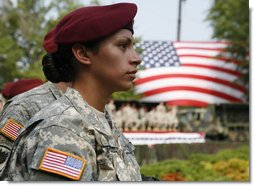 Ever since I left the White House this morning I've been looking forward
to coming here and saying, HOOAHH!
Ever since I left the White House this morning I've been looking forward
to coming here and saying, HOOAHH!
AUDIENCE: HOOAHH!
THE PRESIDENT: It's a pleasure to get out of Washington, to spend some time in the real "center of the universe." (Applause.) It's good to be with the men and women of the 8th [sic]* Airborne Corps and the quiet professionals of the Army Special Operations Command.
I can't think of a better way to spend the 4th of July than with the All Americans of the 82nd Airborne. (Applause.) You're Airborne all the way, and I'm proud to be here with you. We also welcome the men and women of Pope Air Force base, who put the "air" in Airborne. (Applause.) I'm privileged to be in the presence of so many courageous military families who have borne the hardships of war with dignity and devotion. By supporting a loved one in uniform, you are serving our country and America is grateful for your service and your sacrifice. (Applause.)
Today we mark the 230th anniversary of American independence. And on this day, when we give thanks for our freedom, we also give thanks for the men and women who make our freedom possible. Each of you have stepped forward to serve, knowing the risks and dangers that accompany freedom's defense.
I've come to thank you for your valor, and to thank you for your patriotism. I've come to share with you, and with the American people, how your dedication and your sacrifice are helping us win the war on terror. (Applause.) You are serving our country at a time when our country needs you. And because of your courage, every day is Independence Day in America. (Applause.)
Laura sends her best and her love. I'm a lucky man that she said "yes," when I asked her to marry me. I appreciate Lieutenant General John Vines for his introduction. I want to thank all the commanding officers, all the sergeant majors, all who wear our uniform for welcoming me here today. It's a pleasure to be with you.
I'm honored to be here with Senator Richard Burr, United States Senator from the state of North Carolina. He strongly supports the men and women who wear the uniform. And I'm proud to serve with him in Washington, D.C.
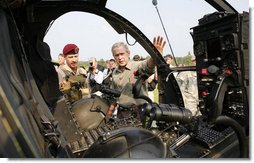 I want to thank all the local officials who are here. Thank you for
supporting the good folks who live here and work here and train here.
It means a lot to the families to know that the local communities extend
the hand of friendship and support.
I want to thank all the local officials who are here. Thank you for
supporting the good folks who live here and work here and train here.
It means a lot to the families to know that the local communities extend
the hand of friendship and support.
Two-hundred-and-thirty years ago, 56 brave men signed their names to a document that set the course of our nation. It changed the history of the world. Our Declaration of Independence was a bold statement of revolutionary principles. It laid down a creed of freedom and a quality that has lifted the lives of hundreds of millions here in America and around the world. Yet, without the courage of the soldiers of our Continental Army, the words of the Declaration would have been forgotten by history, dismissed as the radical musings of a failed revolution.
We celebrate Independence Day each year because that ragtag group of citizen soldiers challenged the world's most powerful military, secured our liberty and planted a standard of freedom to which the entire world has aspired.
Since that first 4th of July, some 43 million Americans have defended our freedom in times of war. These brave men and women crossed oceans and continents to defeat murderous ideologies and to secure the peace for generations that followed. We live in liberty because of the courage they displayed -- from Bunker Hill to Baghdad, from Concord to Kabul -- on this Independence Day we honor their achievements and we thank them for their service in freedom's cause. (Applause.)
At this hour the men and women of Fort Bragg are carrying on this great legacy, facing danger in distant lands and carrying out their missions with all the skill and honor we expect of them. In a time when the terrorists have attacked our homeland and hope to strike again, Americans take comfort in knowing that the soldiers of Fort Bragg are on duty and standing watch for our freedom. (Applause.)
Fort Bragg is the home to some of our country's best and bravest: the men and women of the United States Army Special Operations Command. (Applause.) Army Special Forces define their mission in a motto: "To Liberate the Oppressed." And in the war on terror you've done just that, overthrowing cruel regimes in Afghanistan and Iraq, and bringing freedom to more than 50 million people. (Applause.)
Green Berets were the first U.S. forces on the ground in both Operation Enduring Freedom and our Operation Iraqi Freedom. And along with others, you remain on the offense against the terrorists today. A few weeks ago, I had a chance to visit Baghdad and visit with some of Fort Bragg's finest soldiers, the special operation forces who helped bring justice to the terrorist Zarqawi. (Applause.)
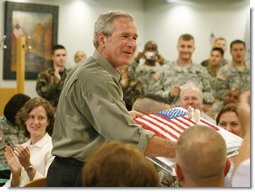 They were the first coalition forces to arrive on the scene after the
bombing of Zarqawi's safe house. They administered compassionate
medical care to a man who showed no compassion to his victims. And when
this brutal terrorist took his final breath, one of the last things he
saw was the face of an American soldier from Fort Bragg, North Carolina.
(Applause.)
They were the first coalition forces to arrive on the scene after the
bombing of Zarqawi's safe house. They administered compassionate
medical care to a man who showed no compassion to his victims. And when
this brutal terrorist took his final breath, one of the last things he
saw was the face of an American soldier from Fort Bragg, North Carolina.
(Applause.)
We're on the offense. In the weeks since Zarqawi's death, coalition and Iraqi forces have launched more than 190 raids on targets across the country. We've captured more than 700 enemy operatives and killed some 60 more. In these raids, we've uncovered caches of weapons and suicide vests and Iraqi army uniforms to be used as disguises in brutal terrorist attacks. We've seized new intelligence information that is helping us keep the pressure on the terrorists and the insurgents. And at this moment of vulnerability for the enemy, we will continue to strike their network, we will disrupt their operations, and we will bring their leaders to justice. (Applause.)
Last week, Iraqi security forces announced the capture of an al Qaeda terrorist from Tunisia named Abu Qadama. He's one of the men responsible for the bombing of the Golden Mosque in Samara. The Golden Mosque is one of Shia Islam's holiest sites, and the terrorists blew it up in the hope that this vicious act would provoke sectarian reprisals and drag the nation into civil war, and derail the formation of the unity government. Hundreds of Iraqis were killed in the violence that ensued.
But in the end, Iraqis stepped back from the abyss. They want to live in a free and peaceful society. Their mothers are no different from the mothers here in America who want their children to grow up and be able to realize dreams. They came together to form a new government. Iraqi and coalition forces working together have brought justice to a key player in the Samara attack. We're going to continue to strike blows against the terrorists. We'll continue working to support Iraq's new government.
When I spoke here a year ago, Iraqis still had a transitional government that was operating under administrative law issued before the restoration of sovereignty. Today, Iraqis have a permanent government chosen in free elections under a democratic constitution that they wrote and they approved. And the Iraqi people have a courageous leader in Prime Minister Maliki, who has formed the cabinet and laid out a clear agenda for the people of Iraq.
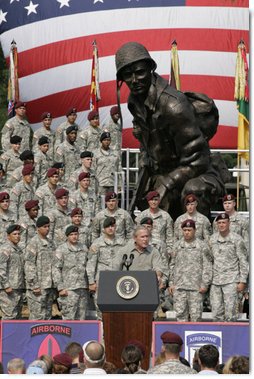 I met the Prime Minister. I met with his team. I was impressed by
them. I was impressed by his strength. I was impressed by his
character. I was impressed by his determination to succeed. He's laid
out an ambitious plan to improve its economy and deliver essential
services and to defeat the enemies of a free Iraq. And I told him this,
that as he stands up for freedom, the United States of America will
stand with him. (Applause.)
I met the Prime Minister. I met with his team. I was impressed by
them. I was impressed by his strength. I was impressed by his
character. I was impressed by his determination to succeed. He's laid
out an ambitious plan to improve its economy and deliver essential
services and to defeat the enemies of a free Iraq. And I told him this,
that as he stands up for freedom, the United States of America will
stand with him. (Applause.)
There's more work to be done in Iraq. The Iraqi people face deadly enemies who are determined to stop Iraq's new unity government from succeeding. They can't stand the thought of liberty. Our strategy is clear, our goals are easy to understand: We will help Iraq's new leaders, we will help the people of Iraq build a country that can govern itself and sustain itself and defend itself as a free nation. Our troops will help the Iraqi people succeed because it's in our national interests. A free Iraq in the heart of the Middle East will make America and the world more secure. (Applause.)
I'm going to make you this promise: I'm not going to allow the sacrifice of 2,527 troops who have died in Iraq to be in vain by pulling out before the job is done. (Applause.)
General Casey is working with the Iraqi government on a path forward. But we're not going to set an artificial timetable for withdrawal. Setting an artificial timetable would be a terrible mistake. At a moment when the terrorists have suffered a series of significant blows, setting an artificial timetable would breathe new life into their cause. Setting an artificial timetable would undermine the new Iraqi government and send a signal to Iraq's enemies that if they wait just a little bit longer, America will just give up. Setting an artificial timetable would undermine the morale of our troops by sending the message that the mission for which you've risked your lives is not worth completing. We're not going to set an artificial timetable to withdraw from Iraq. I will make decisions about troop levels in Iraq based on the advice that matters most -- the measured judgment of our military commanders. (Applause.)
I'll make you another pledge: We're going to make sure you have the resources you need to defeat our enemies in Iraq and secure the peace for generations to come. I believe in you, and I believe in all the men and women who are serving in the cause of freedom with such courage and such determination. You're winning this war -- and enemies understand that, too.
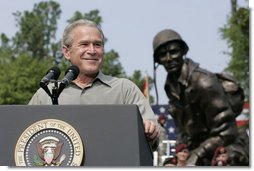 We get all kinds of evidence when we raid these safe houses, about their
concerns. They bemoan the fact that we're keeping the pressure on them.
They see the successes we're having in training. They know we're
damaging their cause. This moment when the terrorists are suffering
from the weight of successive blows is not the time to call retreat. We
will stay, we will fight, and we will prevail. (Applause.)
We get all kinds of evidence when we raid these safe houses, about their
concerns. They bemoan the fact that we're keeping the pressure on them.
They see the successes we're having in training. They know we're
damaging their cause. This moment when the terrorists are suffering
from the weight of successive blows is not the time to call retreat. We
will stay, we will fight, and we will prevail. (Applause.)
Prevailing in Iraq is going to require more tough fighting; it's going to require more sacrifice. And when the job in Iraq is done, it will be a major victory in the battle against the terrorists. By achieving victory in Iraq, we will deny the terrorists a safe haven from which to plot and plan new attacks on America and other free nations. By achieving victory in Iraq, we will send a signal to our enemies that America's resolve is firm and that our country will not run in the face of thugs and assassins. (Applause.)
By achieving victory in Iraq, we will help Iraqis build a free nation in the heart of a troubled region, and inspire those who desire liberty -- those democratic reformers from Damascus to Tehran. By achieving victory in Iraq, we will honor the sacrifice of the brave men and women who have risked their lives and given their lives for a just and noble cause.
Victory in Iraq will not, in itself, end the war on terror. We're engaged in a global struggle against the followers of a murderous ideology that despises freedom and crushes all dissent, and has territorial ambitions and pursues totalitarian aims. This enemy attacked us in our homeland on September the 11th, 2001. They're pursuing weapons of mass destruction that would allow them to deliver even more catastrophic destruction to our country and our friends and allies across the world. They're dangerous. And against such enemy there is only one effective response: We will never back down, we will never give in and we will never accept anything less than complete victory. (Applause.)
We will keep the pressure on them. We will stay on the offense. We'll fight the terrorists in Afghanistan and Iraq and every battlefront in this struggle. Yet, in the long run, we will defeat the terrorists and their hateful ideology by spreading the hope of freedom across the world. Our strategy to protect America is based on a clear premise: The security of our nation depends on the advance of liberty in other nations.
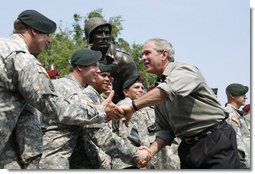 On September the 11th, 2001, we saw that problems originating in a
failed and oppressive state 7,000 miles away could bring murder and
destruction to our country. And we learned an important lesson:
Decades of excusing and accommodating the lack of freedom in the Middle
East did nothing to make it safe. So long as the Middle East remains a
place where freedom does not flourish, it will remain a place where
terrorists foment resentment and threaten American security.
On September the 11th, 2001, we saw that problems originating in a
failed and oppressive state 7,000 miles away could bring murder and
destruction to our country. And we learned an important lesson:
Decades of excusing and accommodating the lack of freedom in the Middle
East did nothing to make it safe. So long as the Middle East remains a
place where freedom does not flourish, it will remain a place where
terrorists foment resentment and threaten American security.
And so we pursue a forward strategy of freedom in the Middle East. We ought to be confident in the pursuit of that strategy, because liberty is universal. And by standing with those who desire liberty, we will help extend freedom to millions who have not known it, and lay the foundations of peace for generations to come. (Applause.)
These are historic times, and I thank you for putting on the uniform, and for volunteering to serve this country during these important times. I have confidence in our country and I have faith in our cause. Because I see -- I know the character of the men and women who wear our nation's uniform. And I know the character of the men and women here at Fort Bragg. We see that character in 24 service members from Fort Bragg and Pope Air Force Base who have received the Silver Start for gallantry in combat. We see that character in men and women who have received serious wounds in battle, but fought on -- exposing themselves to enemy fire to save their comrades and complete their missions.
We see that character in special operations soldiers, like Captain Chip Eldridge. In December 2004, Captain Eldridge was deployed at a coalition base near Shkin, Afghanistan, where he got a report that the terrorists were preparing to attack the base with a rocket. When his unit went out to look for him, his Humvee was hit by an anti-tank mine and his unit came under a barrage of gunfire. He pulled out of his vehicle and he looked down and he saw that part of his left leg had been blown off. Despite the intense pain, he refused pain killers offered by a field medic so he could stay alert to deal with the enemy. Soon, a team of A-10 Warthogs arrived and took care of the terrorists, and Chip and his men were evacuated.
Eventually, Chip was transported to Walter Reed Army Medical Center, where doctors told him that he would be in recovery for at least a year. He told his doctors he had a change of command in six months and that he'd be out of recovery by then. To speed his recovery, he tripled his daily physical therapy regime. He told his physical therapists, "I'm going to need to run, swim, jump out of planes, possibly ride horses; I'm not going to accept anything different." His therapist recalls how angry he was when someone told him he'd never run a sub-7 minute mile again. Chip proved him wrong.
Today, his commanding officer says, "I'd say he's fitter than 90 percent of the people in the unit he commands. In a room with four people, I bet he could beat three of us in a mile run." Chip is here at Fort Bragg, he's jumping out of planes, he's training with his men, and next April, he's heading back to Afghanistan, where he'll once again command a unit in the zone of combat. America is blessed to have brave soldiers like Chip Eldridge. With men like this leading our forces in the battle, the enemy doesn't have a chance. (Applause.)
Like Chip, some of our servicemen and women have returned from war with terrible injuries, wounds they will carry with them for the rest of their lives. Others left our shores to defend freedom and did not live to make the journey home. They left loved ones behind who mourn a loss that time can never fully heal. We hold the families of the fallen in our hearts, and we lift them up in our prayers, and America will always honor their sacrifice. (Applause.)
In the past five years, the men and women of Fort Bragg have met hardships together, and you have looked out for each other. Last year, more than 6,400 members of the Fort Bragg community served as volunteers, put in more than 725,000 hours of service to your friends and neighbors at this base. You've coached little league teams, you've comforted children who miss moms and dads deployed on missions far from home, and you helped returning soldiers make the adjustments from life in a combat zone to life at home.
As you stand with one another here at Fort Bragg, you need to know, America stands with you. We support you. Last week, at the White House, I met with leaders of military service organizations from across this country. These groups are sending letters to our troops and offering scholarships for the children of our fallen and severely wounded soldiers. And they're providing millions of dollars in assistance to families of servicemen and women in need.
I met some remarkable people at that meeting. I met a lady named Emily Dieruf -- Dieruf -- who lost her husband, Nich, in Iraq. Emily Dieruf has dedicated her life to helping our servicemen and women and their families in difficult times. She travels the country raising funds for a group called USA Cares. And together, they provided more than $1.4 million in assistance to our military families.
I met a wonderful lady named Mary Harper. Mary has got five children and a son-in-law in the United States Army, all of them in the Army, and all of them have served in Iraq. Mary was concerned about our troops not receiving mail from home, and so she started something called Operation Shoe Box. Today, she has 500 volunteers working with her, shipping between 500 and 700 care packages a week to our troops in Afghanistan and Iraq and other fronts in the war on terror. People like Mary and Emily represent the heart and soul of our nation, and they make this country proud.
Across our country, Americans are coming together to help our deployed forces and their families. And we can do more. So on this 4th of July, I ask all Americans to take a moment and consider what you might do to support the men and women who wear our nation's uniform. If you're interested in helping, go to a Department of Defense website called AmericaSupportsYou.mil. That's where you can find a place to volunteer, an opportunity to help. I ask every citizen to consider making a contribution to the men and women who defend us, because every one of us owes our freedom to these courageous Americans. (Applause.)
The men and women who serve here at Fort Bragg are making a difference for America, and you're a part of great history. From the Battle of Trenton to the Battle of Tall Afar, brave soldiers have stepped forward to risk their lives for liberty. Two-hundred-and-thirty years after America declared her independence, the Spirit of '76 lives on in the courage that you show each day.
You've given our citizens a priceless gift, the opportunity to live in freedom and to pursue their dreams, and enjoy lives of purpose and dignity. You've kept America what our founders meant her to be: a light to the nations, spreading the good news of human freedom to the darkest corners of earth.
I want to thank you for all you do for our country and for the world. May God bless you all, and may God continue to bless the United States of America. (Applause.)
END 10:27 A.M. EDT
* 18th Airborne Corps


